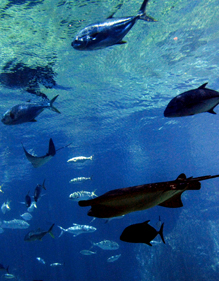|
Getting your Trinity Audio player ready...
|
 By Chantelle Benjamin
By Chantelle Benjamin
15 March 2012 – A multimillion-rand tender by Sekunjalo to combat illegal fishing along the South African coastline is being investigated by the Competition Commission.
The company’s R800-million tender is for the Department of Agriculture Forestry and Fisheries.
Competition commissioner Shan Ramburuth said on Wednesday 14 March that the commission was particularly concerned about the allegations of bid rigging against Sekunjalo after it emerged that the company had submitted four separate bids under different company and consortium names, which were all accompanied by Sekunjalo’s 2010 annual report.
Sekunjalo, which is listed on the JSE, is accused of having gained an unfair advantage in submitting four bids for the tender. This contravenes rules that require that no bidder should have knowledge of the contents of a competitor’s bid.
Questions have also been raised about why the department ignored a conflict of interest arising from the fact that one of Sekunjalo’s subsidiaries, Premier Fishing, has rights to fish in South African waters.
This means Sekunjalo would be both referee and player in a R2-billion fishing industry, giving it a sizeable advantage.
Discussions about whether or not this matter should be probed by the Competition Commission emerged this week and Ramburuth confirmed on 14 March that commission investigators were looking into the allegations against Sekunjalo.
“Bid rigging has been one of the things the commission has been the most concerned about, and much of its work has been around tackling this behaviour because at the end of the day, when it comes to government organisations, it’s the taxpayer who is cheated by having to pay more for a service than is necessary,” he said.
Sekunjalo’s preferred bidder status for the five-year contract was withdrawn after Smit Amandla, the existing service provider and losing bidder, took the department to the Cape High Court. Smit Amandla questioned the tender evaluation process.
The entire tender process is now in question, after the Democratic Alliance alleged in a parliamentary portfolio committee hearing that Smit Amandla had also been appointed without an open tender process.
That company had been waiting to hear if its contract, which ends on 31 March, was to be extended. Instead, Agriculture, Forestry and Fisheries Minister Tina Joemat-Pettersson is calling for an investigation into the previous contracts awarded to Smit Amandla – initially under the Dutch company, Pentow Marine. That contract has cost the department R1-billion with contract extensions, and the minister is now questioning whether the department got value from that deal.
Meanwhile, Sekunjalo had defended its decision to issue four bids, saying in a statement issued through the Johannesburg stock exchange on 7 March: “each (was) structured on a different economic model which provided the opportunity for the department to choose the model which best suited its requirements and those of the National Treasury. Each of these bids were fully and transparently disclosed and supported by presentations as part of the bid adjudication process.”
The company insists that its bid was presented in a transparent manner. It also said that the Department of Agriculture, Forestry and Fisheries was aware of the existence of its fishing fleet, and that this was presented in the bid adjudication process.
Bid rigging is a scheme in which businesses collude so that a competing business can secure a contract for goods or services at a pre-determined price. Bid rigging is recognised internationally as stifling free-market competition, as the rigged price will be unfairly high.
Where the bid responds to a public sector tender it is the fiscus, and hence the public, that bears the cost of artificially inflated prices.
One of the biggest cases of bid rigging being investigated by the Competition Commission involves South Africa’s top five listed construction companies – Aveng, Group Five, Murray & Roberts, Wilson Bayley Homes-Ovcon, and Basil Read – and involves 70 projects valued at R29-billion, some of which are related to construction of the 2010 soccer stadiums, the Gautrain and various road construction projects.
Sekunjalo insists that its bid would not have led to inflated prices for the government despite its obvious advantages. “We have repeatedly stated that our business should be judged on its delivery and on its cost savings to government along with job creation and skills development and, more importantly, enterprise development,” it said.
David Lewis, executive director of Corruption Watch, commented: “The circumstances surrounding Sekunjalo’s bid suggest gross irregularities. We are pleased that the Competition Commission is investigating the apparent bid rigging aspects. However, there are also inferences of bid corruption and fraud that, on the face of it, warrant a criminal investigation.”
Read Sekunjalo CEO Khalid Abdulla's response to this article here.





